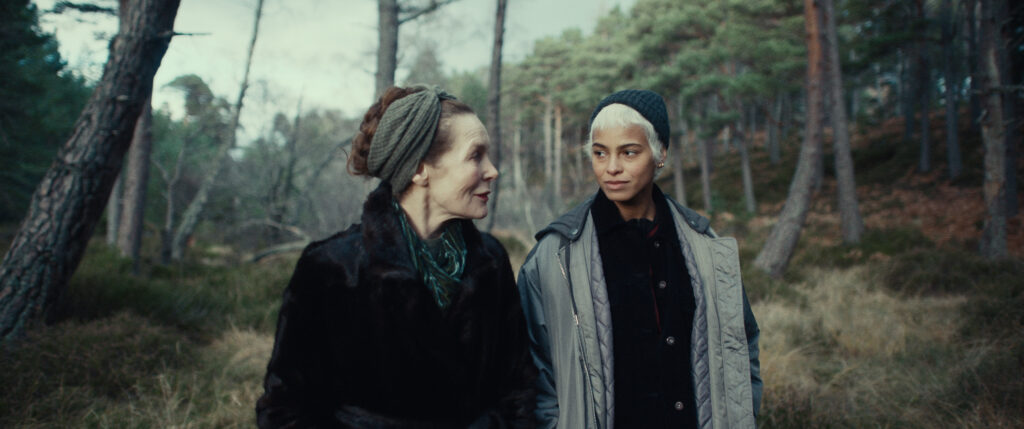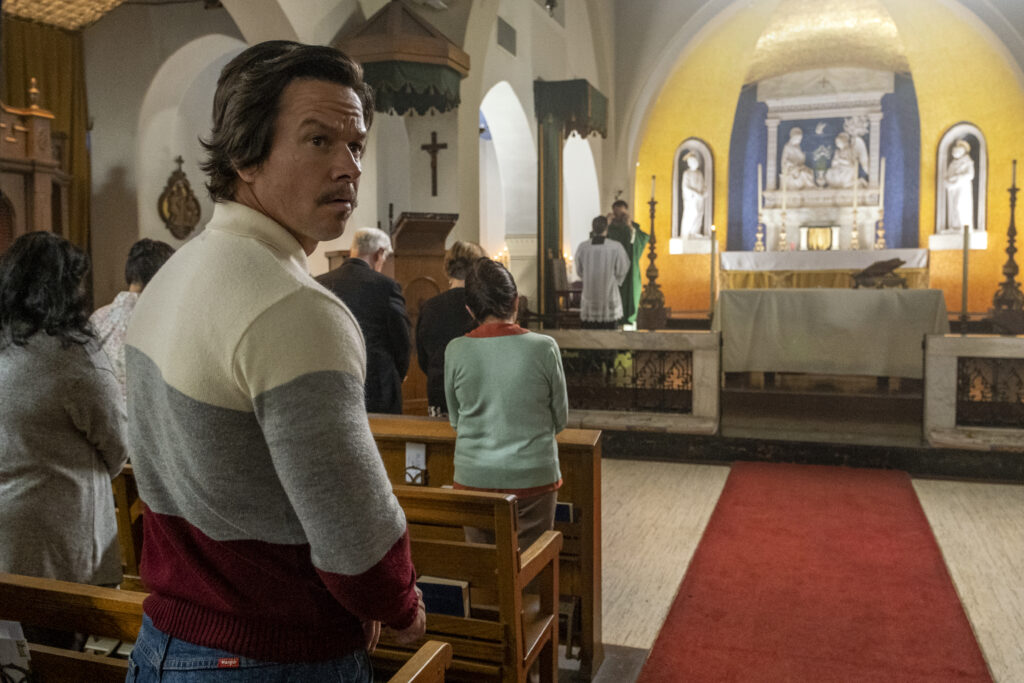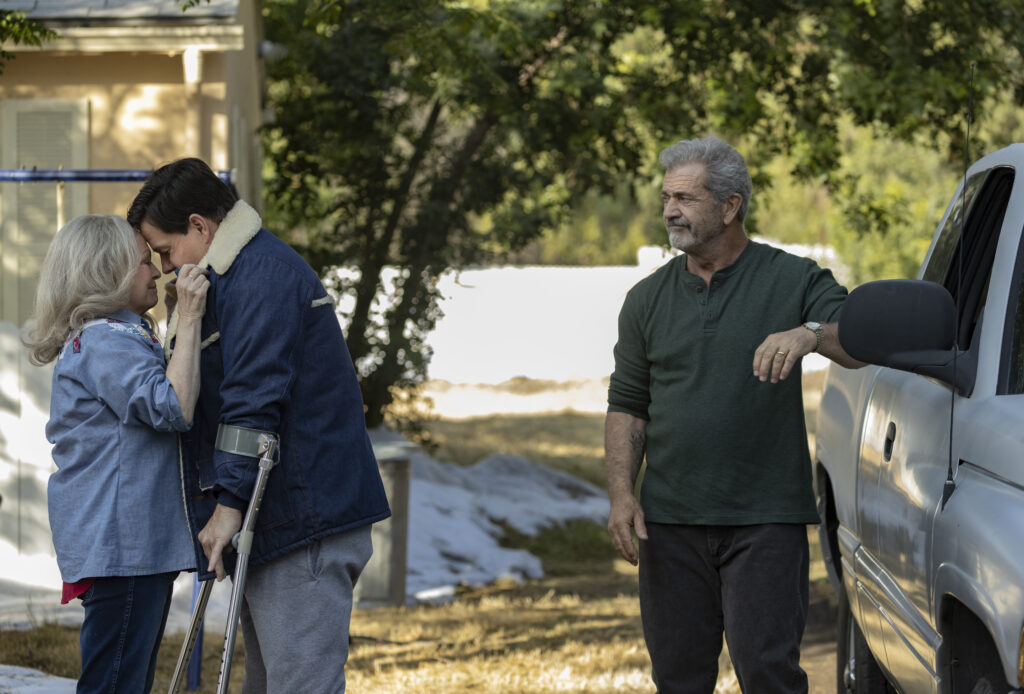August 21, 2022
by Carla Hay

Directed by Charlotte Colbert
Culture Representation: Taking place in Scotland, the horror film “She Will” features a predominantly white cast of characters (with a few black people and one Asian) representing the working-class, middle-class and wealthy.
Culture Clash: A middle-aged actress, who’s been famous since she was a child, goes to a retreat in rural Scotland, where she is haunted by memories of a traumatic past, and she decides to do something about it.
Culture Audience: “She Will” will appeal primarily to people who don’t mind watching horror movies that have a lot of distracting imagery and useless scenes to cover up for a one-note, very thin concept.

The horror movie “She Will” is a female revenge tale that’s heavy on atmospheric images but lacks substance in storytelling and character development. Too much of the movie is dull and meandering, with no surprises. “She Will” (which has a very man-hating tone to it) essentially goes down a predictable movie path of a woman getting revenge for being abused. It’s disappointing that the movie doesn’t bring depth to any of the characters.
“She Will” is the feature-film directorial debut of Charlotte Colbert, who co-wrote the “She Will” screenplay with Kitty Percy. The movie shows that Colbert certainly has a talent for setting up creepy visuals in an emotionally dark horror movie. But these striking visuals ultimately don’t add up to much when the people in the story are just two-dimensional personalities.
The movie makes a half-hearted attempt to have social commentary about age discrimination and sexual misconduct in the movie industry. However, this commentary is overshadowed by “She Will” turning into a turgid revenge flick. And the movie’s constant misandry becomes very lazy, tiresome and misguided because it tries to equate feminism with having negative perceptions of men. True feminism isn’t about thinking that men should be disliked and feared because they’re men. True feminism is about believing in gender equality.
It’s not an exaggeration to say that “She Will” bungles its feminist messaging by going overboard in the man-hating aspects of the movie. Every single man with a significant speaking role in “She Will” is either a misogynistic creep, someone who is condescending to women, or someone who enables misogyny. “She Will” takes the easiest and most predictable route in how the female protagonist deals with these conflicts, even if her decisions are dressed up in horror gimmickry that’s trying desperately to be artsy.
In “She Will,” the central character is a British actress in her 60s named Veronica Ghent (played by Alice Krige), who is deeply insecure about being perceived as an old, unattractive has-been. The movie opens with a montage of showing women getting plastic surgery and putting on makeup. Veronica says in a voiceover: “It’s become a ritual, putting the layers on. Every mask has a function: the eyes, the cheeks, the lips.”
The movie has multiple scenes where Veronica looks in a mirror and seems repulsed or disappointed by what she sees of herself. It’s implied that Veronica is obsessed with her outward physical appearance, especially her face. Years in the movie industry have conditioned her into the sexist belief that female entertainers, more than male entertainers, are expected to look as youthful as possible, in order to be hired for work.
Veronica has been an actress since she was a child. At 13 years old, Veronica became famous when her 1969 movie “Navaho Frontier” became a big hit. “Navaho Frontier” is probably still Veronica’s main claim to fame, because when people talk about her career, “Navaho Frontier” is the movie that is inevitably mentioned. After all these years, Veronica’s fame from “Navaho Frontier” has overshadowed her other work, so she has bitter feelings about being thought of as an actress who peaked before she was an adult.
In recent years, Veronica has become a pill-popping, cranky recluse who’s probably an alcoholic, based on her frequent consumption of alcoholic drinks. Her only companion is her personal assistant Desi Hatoum (played by Kota Eberhardt), a loyal, tolerant and practical-minded employee in her 20s. Veronica’s attitude toward Desi is often cold and haughty. But over time, Veronica sees things about Desi that remind Veronica of when Veronica was young. Not much is known about Desi until later in the story when she opens up a little about her childhood.
The beginning of “She Will” shows how Veronica is rude and dismissive to Desi. It’s also revealed that Veronica is a survivor of breast cancer who has had a double mastectomy and wears prosthetic breasts. When Desi places the removable prosthetic breasts in the bra that Veronica is wearing, Desi says to her employer: “It’s too soon for you to be wearing prosthetics.”
Veronica angrily snaps back, “What do you know?” Veronica adds that she’s had a “mastectomy, not a lobotomy.” Later, Veronica tells Desi, “What I need from you are bandages and the occasional bath.” When Veronica is awake, she overindulges in taking the painkiller Tramadol, which Veronica sarcastically calls “breakfast of movie stars.” When Veronica is asleep, she has nightmares, because let’s not forget that “She Will” is supposed to be a horror movie.
Veronica decides that what she needs is to go on a retreat. This upscale retreat takes place at a mansion in an unnamed, rural part of Scotland in a (horror movie cliché) remote, wooded area. Veronica (accompanied by Desi) is there for what Veronica thinks will be a quiet getaway where she won’t have to interact with any of the other guests at the retreat. Veronica very irritated when she finds out that it’s the type of retreat where the guests are supposed to participate in several group activities.
The retreat only has about five or six guests (all of them are unmemorable), but that’s still too many other people for Veronica, who doesn’t want anything to do with these other guests. She’s miffed when she’s told that the solo retreat that she thought she signed up for is only offered during the summer. Most of the guests immediately recognize Veronica and surround her like star-struck fans. Veronica quickly lets it be known she doesn’t want that type of attention while she’s at this retreat.
Veronica immediately wants to leave with Desi, but they can’t leave, because the roads are flooded due to a recent storm. And because this is a horror movie in a remote, wooded area, it should come as no surprise when Desi finds out that she can’t get a signal on her phone. It’s just the movie’s way of making sure that Veronica are Desi are stuck at this place for most of the story.
The leader of the retreat is an eccentric named Tirador (played by Rupert Everett), who spouts a lot of spiritual guru gibberish, but his qualifications for being a “guru” are very vague and murky. Tirador calls himself a “teacher.” Tirador thinks of himself as an innovative and highly intelligent leader, so he conducts himself with more than a hint of arrogance.
Tirador gets into an unspoken power struggle with grumpy Veronica, who wants to do her own thing at the retreat, but Tirador won’t let her. Tirador’s way of dealing with Veronica is to make her feel like an out-of-touch old woman if she doesn’t go along with what he has planned. He uses mind games and his perceived authority to get Veronica to do what he wants.
Later, Tirador urinates on a tree in front of the retreat guests. He says with a laugh at this indecent exposure, which is a form of sexual harassment because he exposed his genitals without consent: “It’s important to leave your mark on the land.” (The movie doesn’t show any nudity from Tirador, but this nudity is implied.) Tirador, like all of the male characters with prominent roles in “She Will,” is a very obvious symbol of sexist patriarchy. This movie has no subtlety at all.
During her time at the retreat, Veronica continues to have nightmares. She also sleepwalks and finds herself waking up outdoors for reasons that she can’t remember. “She Will” has a recurring image of a sticky substance that resembles black mud, which keeps showing up in places where Veronica happens to be. Tirador mentions at one point that Earth (as in Mother Earth) is supposed to have healing powers affected by witches that were burned at the stake. (Again, no subtlety at all.)
Later, Tirador leads the group in an art class that takes place outdoors, where the retreat guests are doing illustrations with charcoal. Veronica predictably draws a sketch representing her nightmares. And then the mysterious mud shows up again. And again and again and again, until the mud (which just looks messy, not scary) fails to have a shocking impact in what’s supposed to be a horror movie.
Veronica gets a little closer to emotionally bonding with Desi when she asks Desi one day: “Would you go back and relive your childhood?” Desi replies, “Not even if you paid me.” Veronica confides in Desi: “I’m having dark thoughts.” Desi says, “That’s normal. Everyone has them.” Veronica adds, “I mean, really dark thoughts.”
Desi’s mental health issues are eventually revealed in the movie. “She Will” has a subplot about Desi meeting a local guy named Owen (played by Jack Greenlees) at a pub in the nearest town. Desi is at this pub because she wants a break from constantly being around dreary Veronica at this retreat. Desi and Owen have an immediate flirtation. But because “She Will” is a horror movie, don’t expect things to go smoothly in this possible romance.
It’s eventually revealed that Veronica has gone to this retreat because she wants to hide out from the media and other people. That’s because of the recent news that “Navaho Frontier” director Eric Hathbourne (played by Malcolm McDowell) is about to be knighted. Eric has also been in the news because he wants to remake “Navaho Frontier,” and he’s been conducting an extensive search to find a teenage actress for the starring role that Veronica originally had.
There’s a scene in “She Will” where Veronica sees Eric being interviewed on a TV talk show that’s hosted by a well-known TV personality named Podrick Lochran (played by Jonathan Aris). Podrick asks Eric if he’s ever done anything illegal, in reference to stories that Eric had an illegal sexual relationship with underage Veronica when making “Navaho Frontier.” Eric replies defensively, “It was a different era. We were very close. We had a special bond.” (In other words, Eric doesn’t deny that he had a sexual relationship with underage Veronica.)
And you know what that means in a female revenge horror movie made during the #MeToo era. “She Will” overloads on nightmarish visions that are supposed to blur the lines between Veronica’s fantasies and realities. And yes, there are stereotypical scenes where Veronica’s inner child—specifically, Veronica as a 13-year-old (played by Layla Burns)—appears as a haunting figure. After a while, it becomes tedious when the first two-thirds of the movie are essentially this back-and-forth slog of nightmares, Veronica’s moodiness and the mud appearances, with not much to move the story along.
And although Krige gives an admirable performance as Veronica (all the other cast members give average performances), take away all the flashy and eye-catching imagery, and “She Will” doesn’t have much of an intriguing story. Desi is very underdeveloped as a character and only seems to be in the movie for a “female solidarity” plot development in “She Will.” As a horror movie, “She Will” ultimately fails at being suspenseful once it becomes obvious who will be the target of revenge and why.
IFC Films/IFC Midnight released “She Will” in select U.S. cinemas, on digital and VOD on July 15, 2022.


